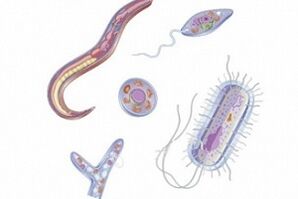
In many situations, parasites in the human body become the cause of serious illness. When they begin to be active in internal organs and systems, their health condition is rapidly deteriorating. Parasites absorb almost all the nutrients that come with food, and release a large amount of toxins that accumulate in the body.
There are 3 types of parasites that infect humans at any age:
- The simplest- unicellular organisms. Their sizes vary from microscopic to 1-2 mm. Despite their small size, they cause colossal harm to health, provoking the development of diseases called protozoses. Among the most common protozoan parasites are Trichomonas, Giardia, Toxoplasma. You can see how they look in the photo above.
- Helminths or worms- worms that parasitize the human body and provoke the development of helminthiasis. Their size varies from a few millimeters to 18 meters, and absolutely any organ can become the site of localization. They live in the intestines, lungs, brain, eyes. There are three classes of helminths:
- trematodes or flukes (lanceolate fluke, opisthorchus, intestinal eel) - for reproduction they need to change the owner and go through the mandatory stages of development;
- nematodes or roundworms (roundworms, whipworms, trichinella, pinworms) - can multiply in humans in the body, they do not need to change the host for further development;
- cestodes or tapeworms (dwarf and bovine tapeworms, tapeworms) are very dangerous parasites, for which reproduction also requires a change of host, they must go through a developmental stage in the body of animals before parasitizing in the human body.
- Ectoparasites- parasites that live on the body. This category includes lice, ticks. Their presence is easy to spot and eliminate.
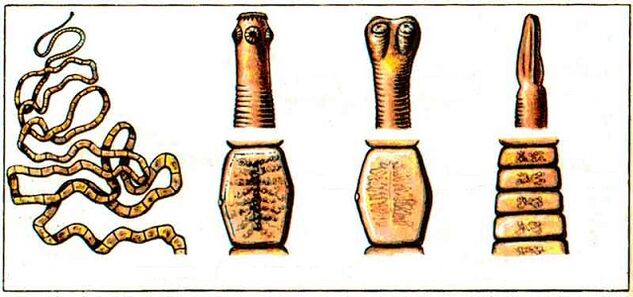
Human parasites live in the body for years, depleting it. At the same time, many simply do not know about their presence - according to statistical data, 80-90% of people are infected with worms.
That is why it is important for everyone to know how you can become infected with helminths, what are the signs of helminthiases.
Why are parasites dangerous?
Helminths living in the human body develop, maintain their vital activity and multiply, using the resources of the body of their owner. This is extremely harmful to health. Their digestive system is poorly developed and is not suitable for self-digestion of food.
In the process of vital activity, worms:
- take away nutrients - the body begins to deplete, it cannot function normally, therefore it gets sick;
- drink blood - if a lot of worms that feed on blood parasitize the body, this provokes the development of anemia;
- emit dangerous toxic substances - they accumulate, poison the body, affect all organ systems;
- damage organs, tissues, mucous membranes - many types of helminths have suckers, hooks necessary to attach to the surface of internal organs, causing serious damage;
- clog ducts, passages - with a large number of worms, they create whole colonies that clog the bile and other ducts, which leads to intestinal obstruction, disruption of metabolic processes;
- form tumors, as well as cysts in vital organs, systems - most often, infection with echinococci, for which a person is an intermediate host, leads to similar consequences, their larvae, getting into any organ, begin to transform into a tumor;
- destroy leukocytes, which has immeasurable harm to the immune system, it gradually collapses, loses its ability to withstand negative factors, so the carrier of worms is often sick.
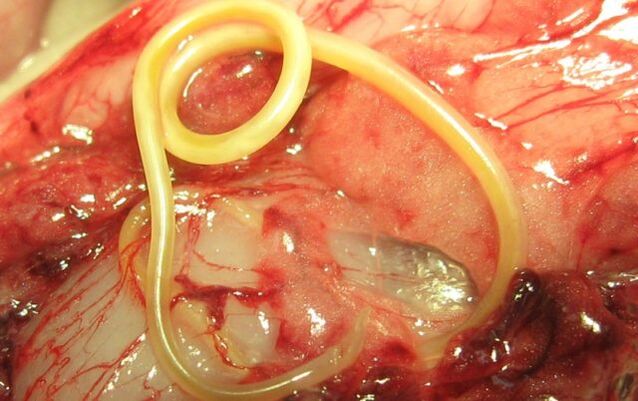
Living in a person, helminths provoke the development of a huge number of diseases:
- pancreatitis, cholecystitis, hepatitis most often provoke lamblia, parasitizing in the gallbladder, liver;
- cardiovascular diseases - worms penetrate the blood vessels, disrupt the blood flow, and can provoke a stroke;
- arthritis, joint problems;
- disorders of the nervous system - worms absorb manganese, copper, and other elements necessary for its normal functioning;
- bronchitis, chronic cough - especially often provoked by roundworms, which, in the process of growing up from the larva to the sexually mature individual, migrate throughout the body, passing through the developmental stage in the lungs;
- oncological diseases - worms damage organs, provoke the development of tumors;
- dermatological diseases - due to the strong pollution of the body with toxins, waste products of worms.
As a result of invasion, especially long-term, the appearance of a person is significantly deteriorated. Due to the lack of nutrients and vitamins, skin problems begin, it becomes flabby, dull, wrinkles appear, hair falls out, nails break.
Parasitizing worms is especially dangerous for children. Helminths absorb nutrients, vitamins necessary for the normal growth of the body. This leads to a lag in physical and intellectual development.
How destructive parasites have on the body depends on their type, quantity, and the state of human health. Mixed infestations are especially dangerous when several types of worms parasitize in the body at the same time.
How can you get infected with parasites
It is quite difficult to protect yourself from parasites, even strictly observing the rules of personal hygiene. There are several mechanisms of infection:
- Contact and household- transfer of eggs of worms from person to person by bodily contact, through household items, dishes. This is how pinworms are most often transmitted, as well as other nematodes that go through the entire development cycle in the human body. This means that an infected person releases hundreds of thousands of worm eggs into space, which remain on his body, clothing, and objects with which he came into contact. A healthy person, when using things or interacting with such a person, absorbs the eggs of the worms. They enter the body through the mouth, where they go through all development cycles and actively reproduce.
- Alimentary- due to the use of contaminated water, as well as food, especially vegetables and fruits. Many helminth eggs, especially pinworms, often accumulate on the surface of products. Their surface is covered with a sticky substance, so they are not very easy to wash off.
- Transmissible- through the bites of blood-sucking insects: mosquitoes, fleas, flies and other species. They often become intermediate hosts for parasites that are dangerous to humans.
- Percutaneous or active- the larvae enter the body through the mucous membranes when they come into contact with contaminated water during bathing, or the body comes into contact with the soil, where there are helminth larvae on the surface. In this way, schistosomes and other worms are transmitted.
Pets, especially dogs and cats, carry a large number of parasites. Even birds can become carriers of helminths.
In this way, you can become infected with such dangerous worms as tapeworm, tapeworm. Their larvae are found in the meat of animals, fish. If you eat infected meat that has undergone insufficient heat treatment, a larva enters the body, which rapidly develops to the state of a sexually mature individual 10-18 m long.
Freshwater fish that has not undergone sufficient heat treatment is also dangerous. Often it is lightly salted or raw fish, caviar that become sources of infection. The pike is the carrier of the tapeworm.

Important!Children, people working with the land, animals, pet owners, travelers to exotic countries, lovers of exotic food and fish that have not undergone heat treatment are at risk of infection with helminths.
Infection symptoms
When worms settle inside the body, health conditions deteriorate, but people often confuse symptoms with signs of other diseases.
Common symptoms of worm infestation:
- Digestive problems - diarrhea, constipation, flatulence. In the process of vital activity, some parasites secrete substances that provoke stomach upset.
- Discomfort and pain in the abdomen.
- Intestinal obstruction - large worms or a large number of small worms block intestinal patency.
- Stagnation of bile - worms parasitizing in the bile ducts, clog them, disrupt the process of bile circulation.
- Allergy - the presence of worms negatively affects the state of the immune system, the concentration of protective cells in the blood increases, and this provokes allergic reactions. Allergization of the body is also caused by the fact that in the process of life worms release many toxins that poison humans.
- Skin diseases - eczema, urticaria, dermatitis and other dermatological diseases, acne and acne.
- Pain in muscles, joints - parasites injure muscle tissue, joints.
- Restless sleep - parasites are especially active at night, so a person does not sleep well, often wakes up.
- Weight problems - you can determine the presence of worms by sharp fluctuations in weight. Their presence can lead to dramatic weight loss or weight gain. In the latter case, a person begins to eat a lot, since the worms absorb useful and nutrients, because of this, there is no feeling of satiety. The weight increases accordingly.
- Teeth grinding during sleep is a typical symptom of helminthic infestation.
- Dysfunctions of the nervous system - excessive irritability, aggressiveness, anxiety, depression and depressed mood.
- Fatigue, asthenia, problems concentrating, mental impairment.
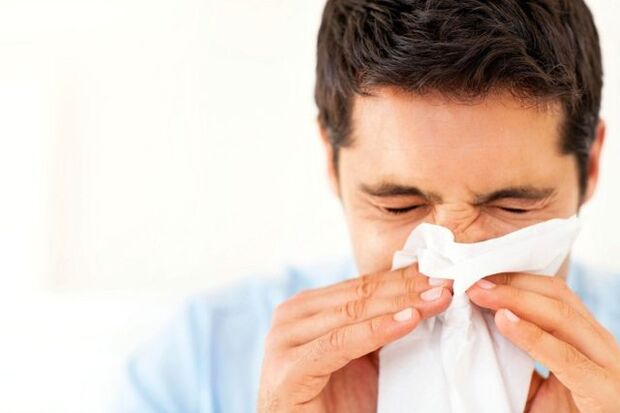

What kind of symptoms appear depends on the type of parasites that have hit the body:
- a typical symptom of pinworm infection is severe itching in the anus, as well as perineum, abdominal pain, vulvovaginitis, dermatitis;
- roundworms provoke liver disease, dermatitis, vomiting, abdominal pain, especially in the navel, loss of appetite, intestinal obstruction;
- Trichinella infection leads to the development of icteric syndrome, pancreatitis, nervous disorders, muscle pain, fever;
- flukes provoke indigestion, fever, biliary colic, insomnia, allergies, excessive irritability, balance problems, asthenia, suffocation;
- whipworms lead to anemia, dysbiosis, and vitamin deficiency;
- the result of parasitizing tapeworms and tapeworms is weakness, indigestion, headaches, apathy, anemia, excessive pallor, weight loss.

When a person develops such symptoms, it is important to undergo a thorough diagnosis in order to check whether helminths have settled in the body. This will allow you to identify the disease at an early stage and protect against serious health problems.

Methods for the diagnosis and treatment of parasites
Special diagnostic methods will help to identify parasites. They allow you to establish not only their presence, but also determine which types of helminths live in the body:
- Analysis of feces for eggs of worms - reveals eggs of helminths, as well as fragments of parasites in the feces. The accuracy of this diagnostic method is 30-35%, since parasites lay eggs at a certain frequency, and not daily. In order for the analysis to be reliable, with a single negative result, it must be repeated 3-4 times. The method allows you to identify worms that parasitize in the intestines, in particular pinworms, ascaris.
- A scraping or smear is an effective diagnostic method for detecting ascaris, as well as pinworms that lay eggs in the area around the anus, as well as in the perineal area. To obtain an objective result, you also need to go through 2-4 procedures. A single negative result is not 100% reliable.
- General blood test - with a decrease in the level of hemoglobin and an increase in the concentration of leukocytes, it is possible to assume the presence of helminthic invasion.
- An enzyme-linked immunosorbent assay is the most accurate diagnostic method that allows you to determine the type of parasites, as well as to establish their approximate number, even if they are localized directly in the organs and cannot be detected by other methods. Worm infestation is evidenced by the presence of certain antibodies that are formed as a protective reaction of the body to infection. For each type of worm, a separate enzyme-linked immunosorbent assay must be performed.
- Analysis of the secretions produced by the duodenum is necessary to identify worms localized in the internal ducts.

Among the additional diagnostic methods that help determine the localization of parasites, as well as their number, it is worth mentioning tomography, endoscopy, ultrasound.
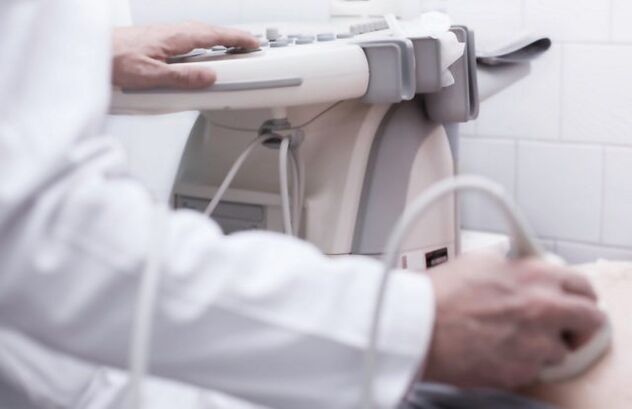
If, as a result of the diagnosis, it was possible to confirm the presence of worms and determine their type, treatment should be started immediately. It is important to find out which helminth parasitizes in the body in order to choose the most effective medicine.
When children need to be treated for helminthic invasion, it is better to use suspensions rather than tablets. They have a softer effect.
To cure helminthic invasion, you need to contact a therapist, infectious disease specialist or pediatrician. These specialists will help you choose the most effective anthelmintic therapy.

Prophylaxis
To minimize the risk of developing helminthiasis, you should constantly take preventive measures:
- Wash your hands thoroughly before every meal, after using the restroom, contact with animals, the ground.
- Wash fruits and vegetables with detergents, since the eggs of the worms are not easily washed off with plain water.
- Drink only purified water.
- Buy meat, fish exclusively in reliable retail outlets, where the products undergo veterinary and sanitary examination. The carcass must be stamped accordingly. It is not safe to buy food from your hands, because you do not know in what conditions the animal was kept.
- If helminths are found in the meat, destroy it.
- Before use, meat and fish should be sufficiently heat treated.
- Deworm pets regularly, at least twice a year.
- Strictly follow the rules of personal hygiene - cut your nails short, especially for children, regularly change underwear and bedding.
- Destroy insects that can carry helminth eggs.
- Do not swim in rivers, lakes, near which there are pastures.

These rules should be followed constantly. Even a single neglect of prophylaxis increases the risk of infection with worms.
Helminthiasis is a serious disease, when diagnosed, it is important to immediately begin competent treatment. Self-medication is dangerous, since anthelmintic drugs have a very pronounced toxic effect. Their use can negatively affect the state of health. Only a qualified doctor will determine what kind of invasion the patient has, and then select the optimal medication and treatment regimen.

















